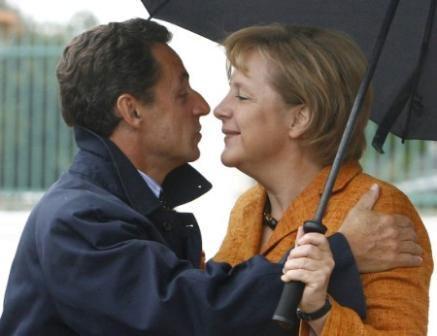
Nicolas Sarkozy and Angela Merkel: The end of the relationship? photo: Chesi - Fotos CC
Socialist Francois Hollande’s victory in the first round of the French presidential elections has sent jitters through global stock markets. Investors are “spooked” at the prospect of a Socialist government, according to The Financial Times.
There are also fears for the future of the eurozone if incumbent Nicolas Sarkozy loses power; his close co-operation with German Chancellor Angela Merkel on Europe’s financial future led to the pair being dubbed “Merkozy”. While Sarkozy has so far supported Germany’s austerity-led policies, Hollande has said he wants to stimulate growth.
The Socialist candidate is not the only cause of financial market uncertainty: the Dutch cabinet has resigned following the collapse of the country’s austerity budget talks.
Go behind the headlines of the French presidential election with The Periscope Post’s comment round-up.
The end of Merkozy? “The Merkel camp has been praying for a Sarkozy comeback,” wrote Ian Traynor in The Observer, but at the same time, the German Chancellor has been preparing for the prospect of dealing with Hollande. According to Traynor, Sarkozy’s “second-fiddle status” in the Merkozy relationship has been humiliating for France, and “it is here that Hollande is planning to challenge Merkel most fundamentally – on the policies and strategies that have entrenched German fiscal rigour and austerity as the eurozone’s answer to the crisis”.
Austerity versus stimulation. The French presidential elections are important to the rest of the world, including the US, because of the potential effect on the eurozone. If Hollande is elected, Germany could be persuaded to “ease up on austerity and come up with a plausible growth strategy”, said Ezra Klein at The Washington Post’s Wonkblog. Then again, Germany could simply decide to “cut its losses”: “Hollande’s election could, in other words, permit a course correction that is already overdue in Europe. Or it could trigger a crisis that further imperils the European project and sends shockwaves of financial uncertainty over to our shores,” Klein wrote.
Learn more about the Merkozy eurozone plans at The Periscope Post.
Investors have nothing to fear. French investors have been increasingly unnerved at Hollande’s financial policies, which include a supertax on millionaires, the lowering of the retirement age and greater spending on education. But “alongside the leftist gesturing, Mr Hollande has quietly set forth deficit-reduction plans that closely track those of the incumbent, while putting more emphasis on tax rises than spending cuts”, wrote Sam Fleming in The Times (£).
Enemy of finance? At the beginning of his campaign, Hollande declared that his ultimate enemy is “the world of finance”, pointed out Robert Peston at the BBC. However, this doesn’t necessarily mean that a Hollande victory will lead to a war on French banks. “The logic goes that he must be aware that the French state dare not alienate the international investment community to any great extent,” wrote Peston. “Which is why many influential investors see Mr Hollande as an intriguing politician with a lot of mouth but not a huge amount in the trouser department.”

